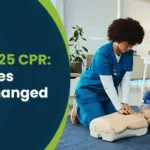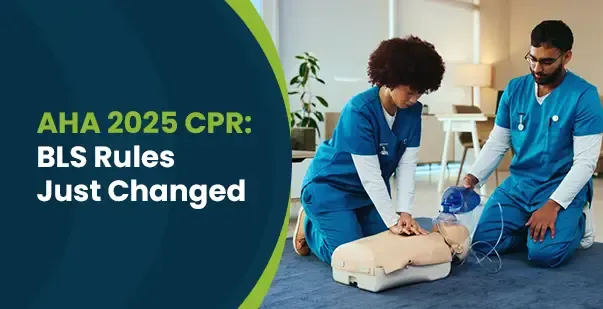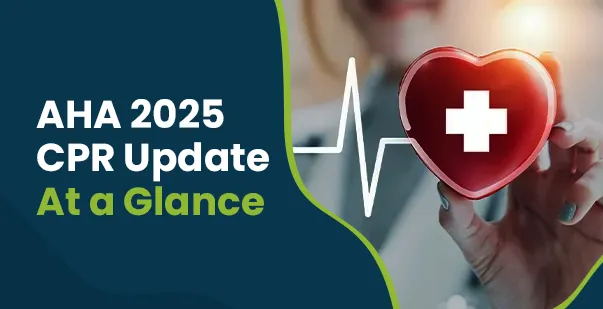If you’ve ever wondered why you should consider renewing your CPR certification, you should know that in just the last two decades alone, techniques have changed so dramatically that you may now actually put lives at risk if you are doing it the old way.
Even the core CPR process has changed, now with more emphasis placed on compression and circulation instead of breathing, as it was about 15 years ago. With two-person CPR, the recommended ratio was 15:1, or one breath for every fifteen compressions ten years ago, whereas now they recommend 30:2. CPR will continue to evolve as science progresses. As long as saving human lives remains a serious business, it is essential that you renew your CPR certification.
Update your expired CPR certificate with us today and get re-certified according to the latest national guidelines. For the easiest and most seamless CPR renewal, take a look at the courses on offer. Our intuitive courses can help you understand key ideas quickly, and you can even get re-certified in just under a few hours.
CPR certifications are only valid for two years. If you need to be CPR certified, you’ll have to renew it on a regular basis. Set a reminder for yourself six months before your certificate expires and schedule renewal training. Even if you aren’t obligated to keep your certification up-to-date for work, it’s crucial to keep your knowledge current because you won’t be dealing with CPR on a regular basis in the time between this semi-annual renewal.
Remembering Proper CPR Method
We tend to forget things that we do not constantly think about. This is especially true for CPR, as it is not every day that we come across situations where our intervention would determine whether a life is lost or saved. If it has been a long time since you learned CPR, you should seriously consider getting re-certified as there is a big chance that you may have forgotten some important detail of the technique. If you want to be prepared to save lives, it is imperative that you follow the correct steps with the appropriate level of intensity. Forgetting any part of the process can have critical repercussions. A study further revealed that only less than half of CPR trained participants could pass a test one year after training. So renew your CPR certification today!
Furthermore, re-training also builds muscle memory for the physical components of CPR and will help you react fast and properly in a crisis situation. It is also likely that you haven’t even thought about CPR training since your last class — that is, if you are not an emergency first responder or work in healthcare.
Jobs Requiring CPR
Medical workers are required to renew their CPR certification as part of their job requirements. Knowing the latest emergency medicine techniques will significantly improve the survival rate of patients. Depending on your profession, you could even be let go for not maintaining a CPR certification.
Evolving CPR Techniques
Refreshing your CPR knowledge will keep you aware of the latest correct ways to save lives. CPR guidelines are usually updated every few years. In the business of saving lives, change is constant.
For example, the emphasis on chest compression was one of the more general improvements to CPR guidelines. In the first 50 years after the AHA was founded, the recommended rate of chest compressions climbed from 60 compressions per minute to roughly 100 compressions per minute. After further study, the rate was re-adjusted to 115-120 compressions per minute, which is now the recommended rate.
Moreover, the ABC method, which stands for airway, breathing, and compressions, was updated by the AHA in 2010, and the order now reads CAB. Compressions were prioritized because they aid in maintaining blood flow to the brain. Providing chest compressions minutes later, as indicated by the prior standards, meant that critical time to save a person’s life was being squandered. The CAB order recommends applying compressions first, then clearing the airway, and finally giving rescue breaths.
Reducing Liability
Maintaining an updated CPR certification will undoubtedly help in cases where the law may be relevant. This is almost always the case with something as important as doing emergency lifesaving medical procedures on victims who are at risk of losing their lives.
If you learned CPR a long time ago or have an expired CPR certificate with you, then it is advisable that you spend a little effort getting re-certified and familiarizing yourself with the latest techniques and developments in the field. AHCA’s online CPR courses are always updated to reflect the latest recommendations of the American Heart Association while delivering an engaging learning experience.
Contact us to learn more about our complete catalog of online medical training courses. You can also call us at 1-888-277-7865 to speak with a member of our team for more information about our certification courses. We look forward to working with you soon.









